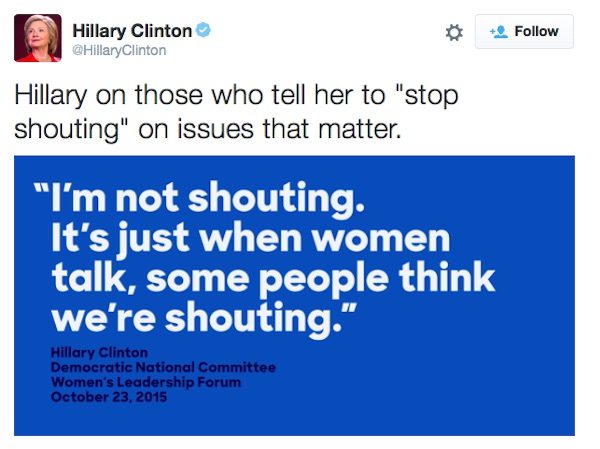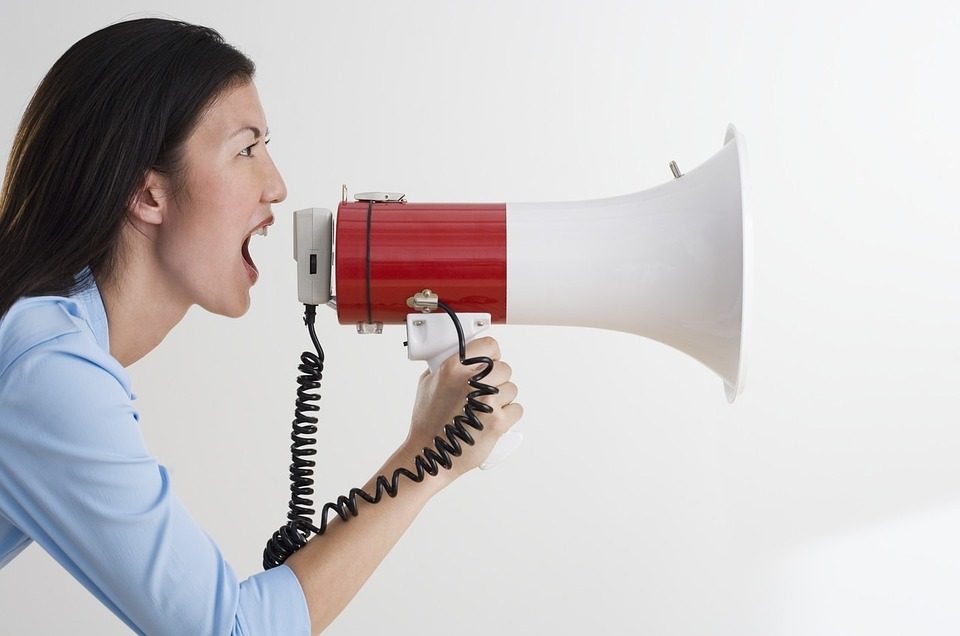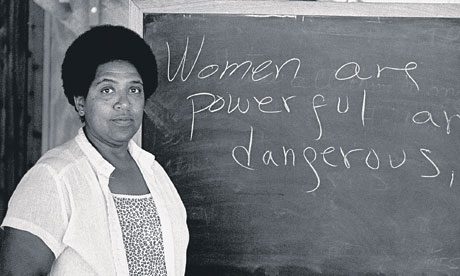Or do men have a listening problem?
When magazines – even ones as reputable as Mother Jones – post stories at 5pm on the Sunday of a 3-day holiday weekend, something is up. Sometimes it’s to bury the news while still reporting it. Other times it’s because some editor dropped the ball.
Kevin Drum’s discursive diatribe “Hillary Clinton Has a Shouting Problem” went up at 5pm May 29. It’s safe to say all of Left Twitter was on a rampage within the hour and it continued long into the night.
Longtime feminist political blogger Digby was among the first:
Oh Kevin … no. https://t.co/XuhJ1ZIohx
— digby (@digby56) May 29, 2016
Armando at Daily Kos agreed:
@kdrum @digby56 Kevin have you really considered where your reaction come from? There is no objective way you can say that.
— Armando (@armandodkos) May 29, 2016
Darren Hutchinson, another political blogger who also addresses race issues, noted:
@kdrum @digby56 You want her to be more “ladylike.” This is the underlying sexism. Be more than passively introspective.
— Darren Hutchinson (@dissentingj) May 29, 2016
The reaction was so immediate and so dogged, that one would almost have thought it was an anomalous column. That no one else had ever said it. That it was just one well-known columnist having a bad night and doubling down on his irritation that the Left woman, not the Left man was going to be the Democratic nominee for president.
But it was really that Kevin Drum is a well-liked and generally respected columnist who we all usually agree with. So to read him using a range of tropes to finally say, “Listen, I like Hillary a lot but she has got to stop this shouting bullsh*t…” was shocking.
This isn’t the first time we’ve heard about Hillary’s shouting problem. When she made history by being the first woman candidate to win the Iowa caucus in February, the morning pundits didn’t signal that – they discussed her shouting at her victory speech. “She shouts,” Washington Post associate editor Bob Woodward said on Morning Joe by way of explaining what he termed Hillary’s “nebulous lack of appeal.”
That meme was repeated on March 16 after she won massive victories in several states and made it virtually impossible mathematically for Bernie Sanders to win the Democratic nomination. That day instead of headlines about her sweeping win of four of the most populous states, there was “Hillary Speaks, Male Pundits Hear Her Shouting” in TIME magazine or the Chicago Tribune’s “Hillary Clinton’s Constant Yelling” and NPR’s “Is Hillary Clinton Still Shouting?”
After Clinton essentially clinched the nomination on April 26 after sweeping NY, PA, MD, DE and CT, what did we see? “Hillary Clinton Shouts that She’s Ahead in the Democratic Race” and “It’s All Over But the Shouting.”
Donald Trump has weighed in on Hillary’s “shouting.” After she delivered her “woman card” speech which ended in her now-classic line “Deal me in!” Trump told CNN’s Chris Cuomo, that he was still “recovering” from Clinton’s “shouting.”
“I know a lot of people would say you can’t say that about a woman, because of course a woman doesn’t shout,” Trump said. “The way she shouted that message was not – that’s the way she said it, and I guess I’ll have to get used to a lot of that over the next four or five months.”
In her compelling profile of Hillary Clinton in New York magazine, Rebecca Traister writes about Clinton’s personal style being…personal. She talks to people one-on-one. She makes connections. She’s empathic beyond all dismissive “she’s shouty and shrill” commentary.
But Traister notes that Clinton is up against the very embodiment of patriarchy and white male privilege, so is it really surprising that the shouting meme is the one people have fixated on? Traister notes this:
“There is an Indiana Jones–style, ‘It had to be snakes’ inevitability about the fact that Donald Trump is Clinton’s Republican rival. Of course Hillary Clinton is going to have to run against a man who seems both to embody and have attracted the support of everything male, white, and angry about the ascension of women and black people in America. Trump is the antithesis of Clinton’s pragmatism, her careful nature, her capacious understanding of American civic and government institutions and how to maneuver within them. Of course a woman who wants to land in the Oval Office is going to have to get past an aggressive reality-TV star who has literally talked about his penis in a debate.”
.jpg)
Trump’s discussed his penis and how large it is in a political debate broadcast to millions, but she’s “too shouty” and someone as well-respected as Kevin Drum felt compelled to double down on his sexist critique even as women and men – many journalists (myself included) – tweeted at him about it.
A year ago Elspeth Reeve deconstructed the voice complaints about Hillary (yes, they go back to the beginning of the primary) in the New Republic. In “Why Do So Many People Hate the Sound of Hillary Clinton’s Voice“.
Reeve begins “You know Hillary Clinton’s voice, right? I mean, you know it. It’s just so loud and annoying. Or maybe it’s like a nagging wife. Or inauthentic – that phony Southern accent! Those flat Midwestern vowels! Whatever it is, her voice is burned into your brain.”
Reeve quotes a New York Times reporter on Clinton, “It allows her to use her quieter-but-confident speaking voice, instead of the VOICE she uses at news conference and at rallies, when she sometimes SPEAKS SO LOUDLY in hopes of conveying ENERGY and FORCEFULNESS (rather than simply projecting her voice better).”
There is even a YouTube video of Hillary’s voice being deconstructed titled: “Hillary Clinton’s Voice Is a Turnoff!” (Yes, there’s an exclamation point, just in case you missed how important it is for Frank Luntz, the man who did the deconstruction, to say this.)
Reeve deconstructs the way women’s voices are actually heard differently from men’s and how women have used or been accused of using various vocal behaviors to get what they want. As if men don’t do the same thing, just differently.

As Reeve explores, study after study shows that women’s voices are judged differently and more harshly than men’s. An easy example is Hillary often lapses into a Southern accent when on the campaign trail. Her accent was quite pronounced when she moved to Washington, but she elided the accent fairly quickly. But lapsing back into the accent she had for all the years she lived in Arkansas is viewed as an example of her being “inauthentic.” Yet President Obama regularly uses a Southern accent while traveling throughout the country and he’s never actually lived in the South. It’s never been critiqued.
In January, Presidential Gender Watch noted after a Democratic presidential debate, “A recent study demonstrates the connection between candidate voice and voter evaluation; Casey Klofstad and Rindy Anderson found that candidates with lower-pitched voices were perceived – by men and women voters – as stronger and more competent than candidates whose voices were higher-pitched. While the study found no direct relationship between candidate gender and evaluation, Anderson notes that women are more likely to have higher-pitched voices, and thus may be more vulnerable to bias in voter perceptions.”
Except perception is everything and gender stereotypes have led society down a specific path with regard to how we “hear” women versus how we hear men.
Masculinity and assertiveness are characterized by strong, forceful voices. Women, conversely, are expected to be soft-spoken and demure, even self-deprecating. In 2008, pundits referred to Hillary as “sounding like a nagging wife.” And while men are allowed to be boisterous and, as Bernie Sanders’ own shouting has been referred to on numerous occasions “passionate,” women are expected to tone it down. The idea that a female candidate for president could constantly take to Twitter and spew out the ranty tweets Donald Trump does daily is absurd. She would be deemed “hysterical” or “whining”and sent packing. Women are expected to be controlled, composed, calm. Cultural norms allow men a wide range of these “passionate” emotions within the context of campaigns. Women? Not so much. In 2008 when Hillary appeared to tear up while campaigning in New Hampshire, there was an outcry that she was using “feminine wiles” or “female manipulation” to lure voters. Her win in the state was linked to that incident, seeming to undercut the breadth of her achievement.

Hillary Clinton is the epicenter for the critique of how women express themselves that most of us have heard all our lives. For a decade I was on the radio, both as the host of the nation’s first lesbian radio program, Amazon Country (WXPN-FM–still on the air decades later), and on a number of other programs on the same station. I also did regular arts and entertainment spots on Philadelphia’s NPR station, WHYY-FM.
One of the shows I hosted was a music show in the middle of the night. One wants to hear a soothing, melodic and restful voice at that time. It’s not the wake-up-and-get-to-work morning show voice we’ve become used to on the drive to school or the office. But I was constantly told my voice, naturally soft and low-pitched, was “too sexy” for the program. I was eventually replaced by a man.
When the Obamas came to the White House, the First Lady was continually referred to as “angry” whenever she spoke. Was she angry or was she used to speaking forcefully as a board member of several major Chicago and national corporations? Was she angry or was she used to speaking forcefully as an attorney? The trope of the Angry Black Woman has been around for a long time. When black women speak they are deemed “angry.” No matter what they are saying. Be it Beyoncé, Michelle Obama, Oprah or your kid’s teacher: Angry.
Google Latina women’s voices and you get “attitude.”
Asian women: “submissive.”
Lesbians: “butch” and “deep.” (There are even YouTube videos “Do You Sound Like a Lesbian?” and “Can You Guess the Lesbian Voice?“)
The critique of women’s voices, be it Hillary Clinton’s or mine or any one of ours is fundamentally about what we are saying, not how we are saying it. Whether it’s Sheryl Sandberg explaining the concept of leaning in or Shonda Rhimes, one of the most successful show runners in American TV, responding to a New York Times characterization of her as an “angry black woman” or Hillary being called “shrill” or “shouty,” the bottom line always seems to be the same: No one is used to hearing what women have to say. So women’s words are transliterated as literally too hard to hear as a means of dismissing them.
And yet.
Really?
When Hillary is on talk shows or we hear her speaking to individuals in crowds that come to see her, her voice is very entré nous. It’s low, it’s quiet, it’s individuated, it’s about the person she is speaking with, not a larger audience.
Could it be we simply aren’t used to hearing women in the public square?
Stanford linguist Penny Eckert told Reeve, “Clinton has a loud and clear voice. A ‘nice’ woman tends to have a breathy voice,” she explained, “sounding a little Marilyn Monroe-ish. There’s nothing breathy about Hillary Clinton’s voice. And if somebody doesn’t want a woman to be powerful they’re not going to like that voice.”

There’s an inherent lose-lose here for powerful women. If we speak in a modulated and classically feminine manner, we aren’t taken seriously or we are considered too sexy. But if we speak forcefully, like men do (has any candidate shouted more than Bernie Sanders on the stump? Let’s get real, here.), we are considered “shouty.”
The most succinct answer to this “problem” that many women, including Hillary, didn’t even know they had, is to tune men’s ears to our collective female voice by having more of us in the public square than just one, lone woman. Men are unused to hearing women and, obviously, to listening to them. There are no female news anchors. There are few women in the top levels of government. Only 17 percent of Congress is female. In films and TV women speak less than 25 percent of the time. The only women’s voices we hear publicly are Hillary’s and those of celebrities.
That, we hope, will change as Hillary becomes more present during the general election and women like the First Lady, Sen. Elizabeth Warren (D-MA) and celebrity surrogates Salma Hayek, Ellen DeGeneres and Kerry Washington campaign for her. And if (when) Hillary is president and fulfills her plan to game-change Washington, D.C. with a 50 percent female Cabinet, the voices of women in the halls of power will become a regular feature.
In the interim, Eckert says of Hillary Clinton and her voice, “She’s putting herself out there. She is not softening anything for anybody.”

Which may be the problem. America is used to women hand-holding and receding to the background, maintaining a shadow presence. We’ve never had a woman in the foreground before in U.S. history. But we are 52 percent of the population. We deserve to have our voices – and what we have to say about our concerns–heard. As Audre Lorde said, “Women are powerful and dangerous.” Fear of that power may be why men feel compelled to try to silence us by saying our voices cannot – and should not – be heard.
